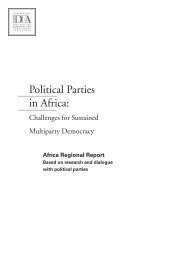Background Document - Danish Institute for Parties and Democracy
Background Document - Danish Institute for Parties and Democracy
Background Document - Danish Institute for Parties and Democracy
You also want an ePaper? Increase the reach of your titles
YUMPU automatically turns print PDFs into web optimized ePapers that Google loves.
Taylor (1807-58) <strong>and</strong> John Stuart Mill (1806-73), whose close intellectual collaboration<br />
found its final <strong>for</strong>m in The Subjection of Women (1869) – the first scholarly dissertation<br />
on the societal significance of gender, published by John Stewart Mill as a memorial<br />
to his deceased wife.<br />
In keeping with the women’s movement in general, Harriet Taylor <strong>and</strong> John Stewart<br />
Mill placed great emphasis on women’s political rights. The right to vote is labelled<br />
“a means of self-protection”, which women had sore need of in questions involving<br />
“interests of women, as such,” since “we know what legal protection the slaves have,<br />
where the laws are made by their masters.” 5<br />
The work was an exemplary exposition of the three classical <strong>for</strong>ms of argumentation<br />
employed by the movement <strong>for</strong> women’s suffrage, <strong>and</strong> which will here be labelled<br />
justice, representation, <strong>and</strong> resources. The first two of these advocate <strong>for</strong> women’s human<br />
rights, including the right to political representation of their interests. The third<br />
claims that it is not only an obligation of a democratic society to allow its entire mass<br />
of talent to unfold, doing so is also beneficial to that society.<br />
While feminist scholars have agreed on the typology, terminology has varied. The<br />
argument of representation is also known as the interest argument or the feminist<br />
argument, because insisting on gender-specific political interests is often regarded as<br />
especially radical. The resource argument is also known as the utility argument or the<br />
utilitarian argument, with reference to its roots in nineteenth-century utilitarianism.<br />
Today, it is typically labelled the diversity argument.<br />
The historical influence of The Subjection of Women can hardly be overestimated.<br />
The book spurred the <strong>for</strong>mation of the <strong>Danish</strong> Women’s Society, chaired by Mathilde<br />
Bajer, <strong>and</strong> it <strong>for</strong>ms the subtext <strong>for</strong> the political debaztes on equal rights that Fredrik<br />
Bajer, as a Member of Parliament, initiated in close collaboration with the women’s<br />
movement. In the years leading up to the turn of the twentieth century, the women’s<br />
movement had changed from being an elite Copenhagen phenomenon to a countrywide<br />
organisation with tens of thous<strong>and</strong>s of activists that had made universal suffrage<br />
a popular dem<strong>and</strong>.<br />
On the local level, the breakthrough came in 1908 with the adoption of a modern<br />
Municipal Voting Rights Act, <strong>and</strong> on a national level the watershed moment was the<br />
adoption of the new Constitutional Act in 1915.<br />
With its duration of some thirty or <strong>for</strong>ty years, the <strong>Danish</strong> struggle <strong>for</strong> universal<br />
suffrage was a brief one when compared with the campaigns in the United States,<br />
France, <strong>and</strong> the United Kingdom, where the dem<strong>and</strong> <strong>for</strong> political rights <strong>for</strong> women<br />
was raised earlier <strong>and</strong> honoured later. In France, this did not happen until 1946. The<br />
violent confrontations that marked the struggle <strong>for</strong> universal suffrage in the United<br />
Kingdom were entirely absent in the <strong>Danish</strong> campaign.<br />
In Denmark, married women were granted the vote by special exemption because<br />
they were unable to fulfil the general dem<strong>and</strong>s in the Voting Rights Act that all voters<br />
have disposal over their estate <strong>and</strong> be taxpayers, until a re<strong>for</strong>m of the Marriage Act<br />
rendered them fully competent in the eyes of the law in 1925 – sixty-eight years later<br />
than their non-married sisters. The tenet that “suffrage was, at bottom, ‘the wife question’”<br />
thus also applies to the history of equal rights in Denmark.<br />
5 Mill 1924, p. 49<br />
“The 1970’ies became the women’s<br />
decade par excellence.”<br />
WOMEN IN POLITICS DANISH INSTITUTE FOR PARTIES AND DEMOCRACY PAGE 50
















